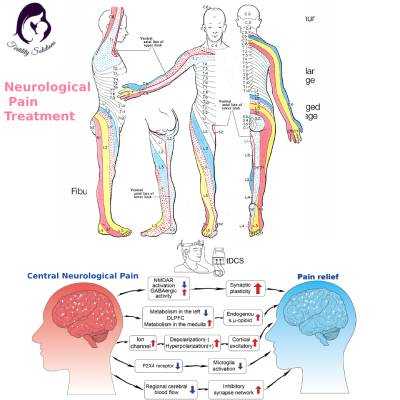Neurological Pain
amrtiyaayuclinic@gmail.com
Dec 10, 2024 12:56 PM
In Ayurveda, neurological pain (often referred to as Vata Vyadhi) is considered a result of imbalances in the Vata dosha, which governs movement and nerve impulses in the body. The Ayurvedic approach focuses on balancing the doshas, promoting nerve health, and alleviating pain through a combination of herbal remedies, dietary modifications, therapies, and lifestyle practices.
Key Ayurvedic Treatments for Neurological Pain
1. Herbal Remedies
Ayurvedic herbs with neuroprotective and analgesic properties are often prescribed:
- Ashwagandha (Withania somnifera): Strengthens nerves, reduces inflammation, and alleviates pain.
- Shankhpushpi (Convolvulus pluricaulis): Improves nervous system health and reduces stress.
- Bala (Sida cordifolia): Renowned for its nerve-strengthening and pain-relieving properties.
- Dashmoola: A combination of ten roots used for its anti-inflammatory and Vata-balancing effects.
- Guduchi (Tinospora cordifolia): A potent adaptogen and immune-modulator.
- Nirgundi (Vitex negundo): Used topically or orally for its analgesic and anti-inflammatory properties.
2. Panchakarma Therapies
Detoxification and rejuvenation are central to Ayurvedic pain management:
- Abhyanga (Oil Massage):
- Warm medicated oils (e.g., Mahanarayana or Bala Ashwagandha Taila) are used to soothe nerves and balance Vata.
- Shirodhara:
- A continuous stream of medicated oil poured over the forehead to calm the nervous system and reduce pain.
- Basti (Medicated Enemas):
- Vata-balancing enemas using oils or decoctions can target neurological issues at the root.
- Kati Basti:
- A localized oil treatment applied to the lower back, beneficial for nerve-related back pain.
- Nasya:
- Administration of medicated oils or powders through the nasal passage for conditions like migraines and cervical radiculopathy.
3. Dietary Recommendations
- Follow a Vata-pacifying diet:
- Warm, moist, and mildly spiced foods.
- Incorporate ghee, milk, almonds, sesame seeds, and fresh fruits.
- Avoid cold, dry, and processed foods that aggravate Vata.
- Herbal teas with ingredients like ginger, cinnamon, and licorice can reduce inflammation and improve circulation.
4. Lifestyle Practices
- Yoga and Pranayama:
- Gentle yoga poses (e.g., Cat-Cow, Child’s Pose, Cobra) enhance spinal flexibility and reduce nerve compression.
- Pranayama (breathing techniques like Anulom-Vilom and Bhramari) calms the mind and balances Vata.
- Meditation:
- Helps manage chronic pain by reducing stress and improving mental resilience.
- Maintain regular sleep patterns and avoid overexertion.
5. External Applications
- Lepa (Herbal Pastes):
- Application of medicated pastes made with ingredients like turmeric, sandalwood, and Nirgundi to painful areas.
- Pinda Sweda:
- Warm boluses filled with medicinal herbs are used to massage affected areas, improving circulation and reducing pain.
Specialized Ayurvedic Oils
- Mahanarayana Taila: Commonly used for joint and nerve pain.
- Ksheerabala Taila: Effective for neurological conditions and weakness.
- Karpooradi Taila: Provides quick relief from localized pain.
Ayurvedic Understanding of Neurological Pain
- Root Cause: Imbalance in Vata dosha caused by factors such as poor diet, stress, lack of sleep, or trauma.
- Treatment Goal: Balance Vata, reduce inflammation, detoxify the body, and rejuvenate the nervous system.
Precautions
- Ayurvedic treatments should be undertaken under the guidance of a qualified practitioner.
- Severe cases may require integration with modern medical interventions for optimal results.
